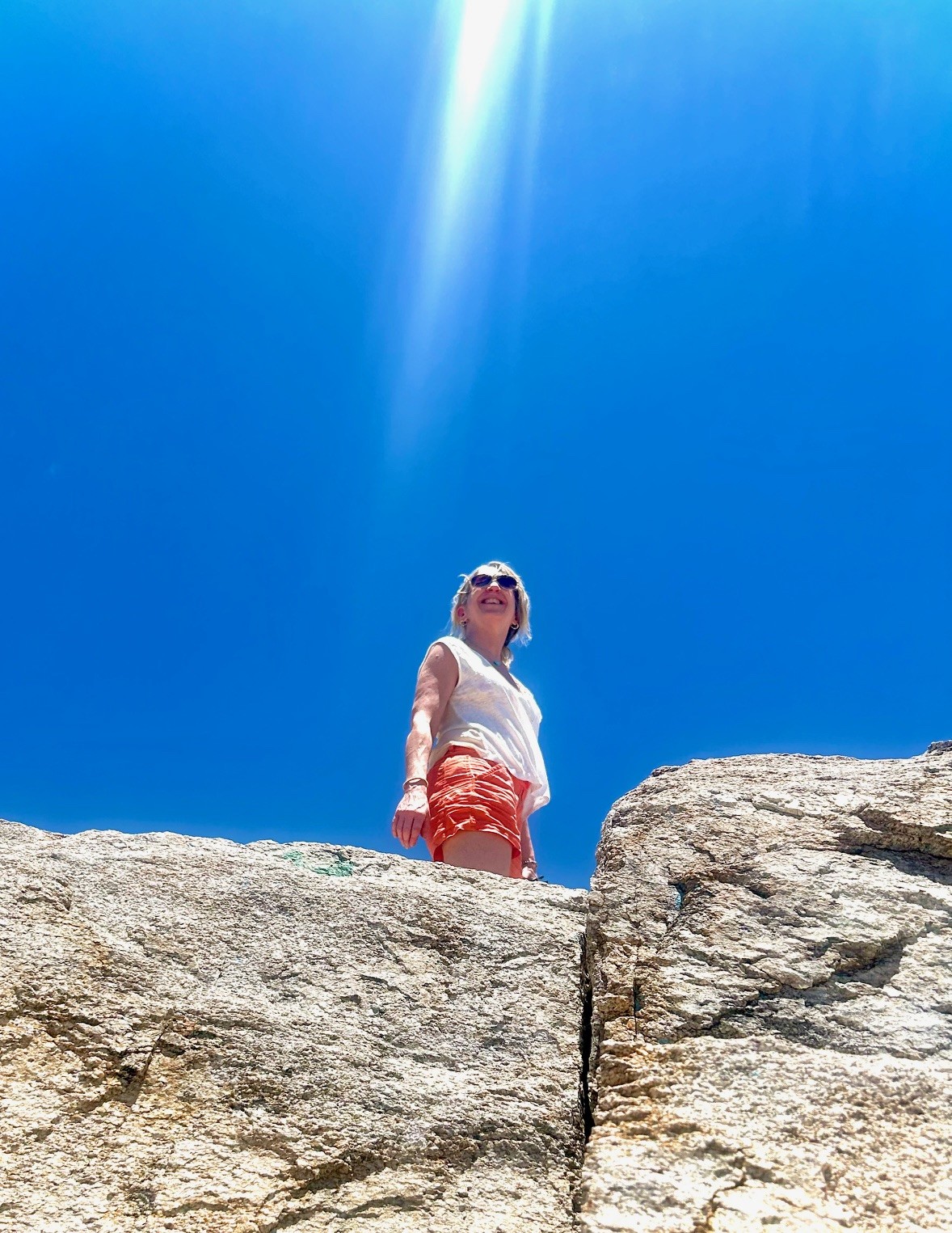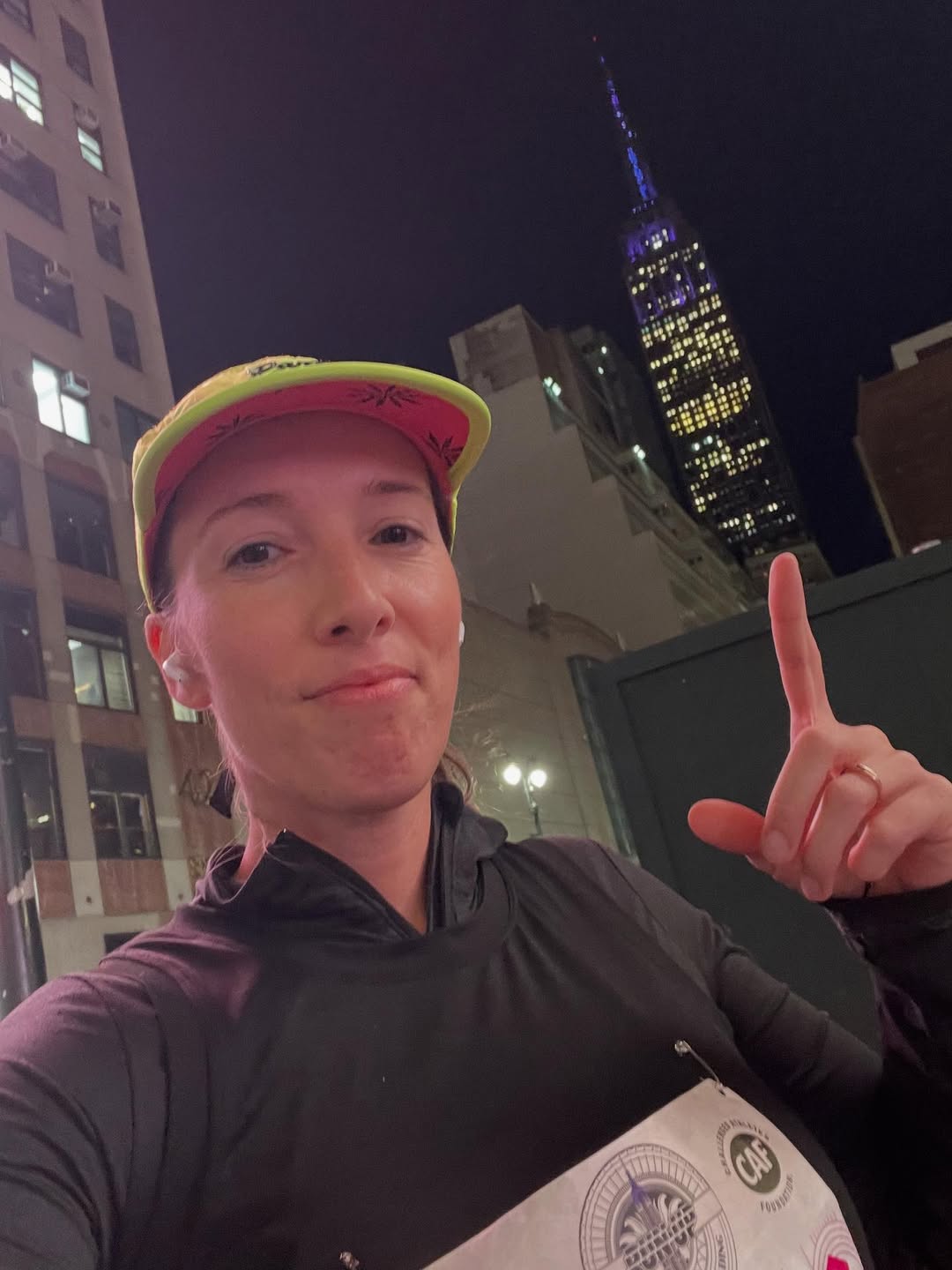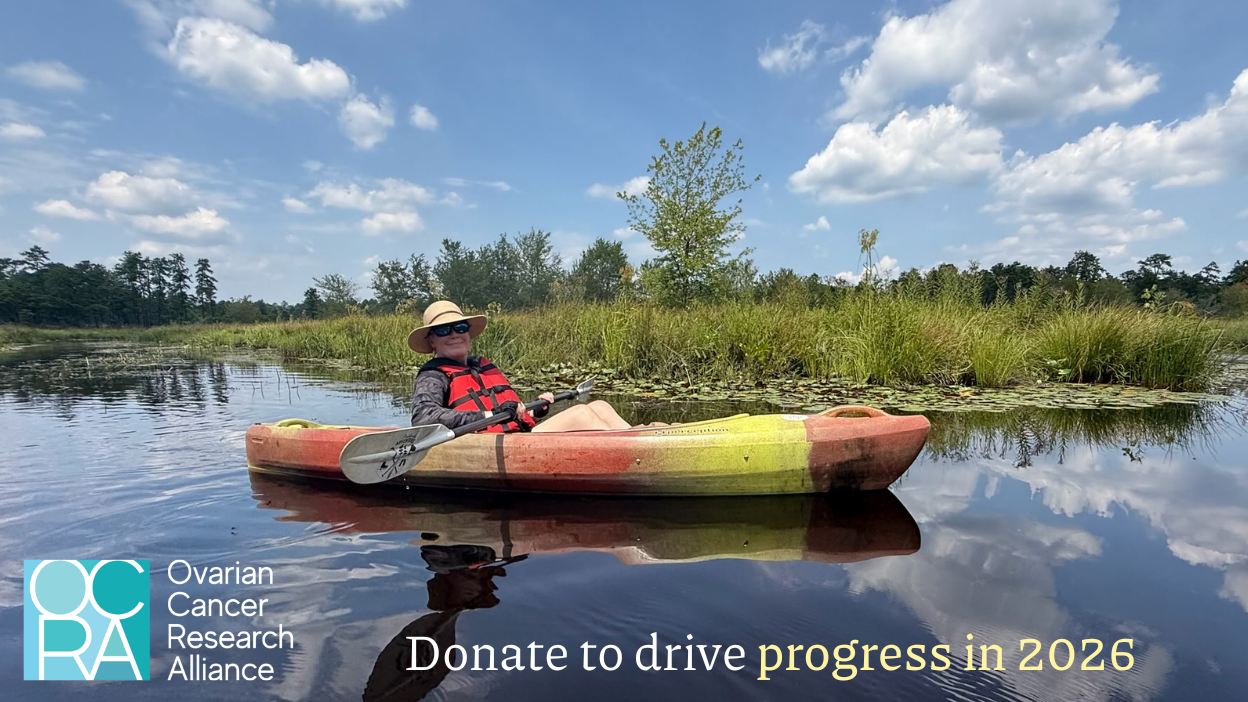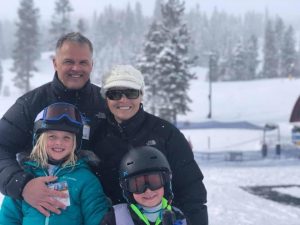
Shelley O’Keefe had been experiencing weird bruising, some fatigue, and lower back pain for a few years. But she’s an athlete — a member of the PGA of America and golf instructor; before that, a Division 1 soccer player; and a former member of the United States Freestyle Ski Team as a mogul specialist. With two kids under the age of 12, running a Junior Golf Academy and three U.S. Kids Local Golf Tours, who wouldn’t be tired, and perhaps a bit banged up?
And then there was that time she had horrific abdominal pain after eating pizza. But Shelley acknowledges that she and pizza don’t always get along. It was when intercourse become painful that her husband Kelly grew concerned.
“He’s the one who truly insisted I go back and see my gynecologist,” Shelley said, even though she had just been there for her yearly exam three weeks before, and nothing was abnormal. “I think that’s the thing that’s really scary.”
Shelley learned she may have ovarian cancer on February 8, 2021. Exactly a week later, she was in surgery. “If I can stress anything about my entire experience,” Shelley said, “it’s ‘be the squeaky wheel.’ I literally called twice a day until they got me in.”
Leaning on community
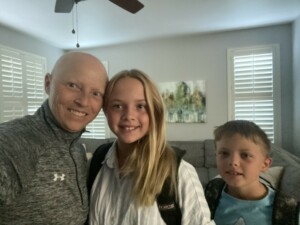
Shelley has a friend whose husband passed away at a young age from a rare form of nodular melanoma. This friend said to Shelley, “I know it sounds really weird right now, because at this moment you’re probably saying, ‘F you, F you, F you, cancer,” (to which Shelley agreed). But the friend said, “At some point, you’re going to turn the corner. I don’t know when, but you’re going to say, ‘thank you, thank you, thank you.”
Shelley said, “It’s such a weird feeling to have because it’s very true. I would not wish this upon anybody. And I’m so angry and scared that I have it; I’m not going to lie. But on the other side of that, there’s so many experiences that have been amazing that I never would have experienced.”
Shelley knows this is a bold statement to make, but she is referring to her incredible golf community that stepped up in so many ways: running her programs, sending care packages, offering encouragement.
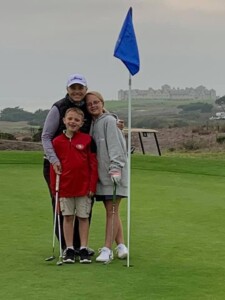
“On any given day, I had at least five or six golf professionals running my tournament, my academy, taking over my classes, doing all of the paperwork,” Shelley said.
She had an incredible team at Golden Bear Physical Therapy led by Monty Merrill, who helped her finish with a par on the 18th hole on a course that she said was the hilliest she had ever played or caddied on.
And then, there was her husband Kelly, “a mother hen.” Shelley talks about the great lengths her husband went to, caring for her while she was undergoing chemo, running the household, and parenting two children ages 8 and 11.
“I think spouses get forgotten a lot during this,” Shelley said. “He’s doing the grocery shopping, the laundry, he’s having to do all the homeschooling because we’re on Covid lockdown. He basically eliminated all of that stuff, just so I could focus on recovery.”
Now, Shelley is focusing on Kelly’s recovery.
A plan in place
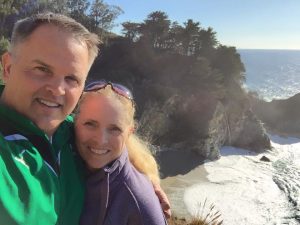
Prior to Shelley’s diagnosis, Kelly — an avid cyclist who works in the veterinary industry — had been planning a two-month, 3500-mile ride across the country to raise awareness and funds for several different charities, including ones that combat suicide among veterinarians. This wasn’t an unusual plan for Kelly; he was in the Peace Corp after college; he ran a marathon for the Arthritis Foundation; he went oversees with the World Vets, an organization similar to Doctors Without Borders, only it works with animals.
When Shelley got her diagnosis, those plans were put on hold. But as it became clear that Shelley was going to be okay, Kelly began thinking about his ride again. And this time, it had an even deeper purpose. His professional passions and his personal life melded into one. He would add one more charity to his efforts: OCRA.
“If she did not feel comfortable with me doing it,” Kelly said, “I would not have left. But we talked about it, and she was all for it.”
Shelley said, “It was really important to me to support his desire to raise awareness for ovarian cancer and other charities that he really cares about. I also felt that the ride could have a secondary benefit of regenerating him mentally and emotionally after giving so much to me over the last year. I wanted him to understand how much I appreciated him as a partner during this whole thing.”
Ride for Five
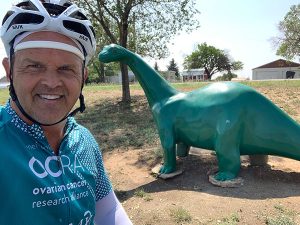
Kelly set out from the Golden Gate Bridge in San Francisco on July 31st with the stated goal of biking nearly 3600 miles across the United States until he reached Savannah, Georgia by the end of September. He averaged between 70 and 90 miles per day. That’s a lot of time in the saddle of a bicycle.
His goal was to raise awareness of the five charities he is riding to support, as well as to raise money. He has created a website and donation pages for each of the five organizations. So far, he has raised nearly $4500 to support ovarian cancer research.
Speaking about those long miles, many of them up steep inclines or in pouring rain, Kelly said, “When it does get a little tough, I just think about those people sitting in the chair with chemo or getting that diagnosis.”
He’s inspired by the late Jimmy Valvano, a college basketball player, coach and broadcaster who died from cancer in 1993, but not before speaking on camera about his outlook on how to live one’s best life. “Don’t give up. Don’t ever give up,” Jimmy said.
Kelly describes that video as “the most powerful 11 minutes” he’s ever experienced.
Of course, Kelly is also inspired by his wife. Speaking about Shelley, Kelly said, “She’s a tougher chick than I even thought before. I know she’s really frustrated with how her body feels now, she’s just got a lot on her plate; she’s trying to do everything, as always. So I just have the highest respect for her strength.”
It’s Shelley’s strength that kept Kelly going, even on the toughest days of the ride. When he faced one of those days where he felt like he couldn’t go another mile, he rode on … because others can’t.
“If my butt hurts at 50 miles or I’ve got a little pain in my knee,” Kelly said, “it’s just nothing compared to what other people are going through.”
And at the end of the day, he feels if he can save even one life through raising awareness or supporting research, then the trip will have been more than worth it.
The strength of a marriage
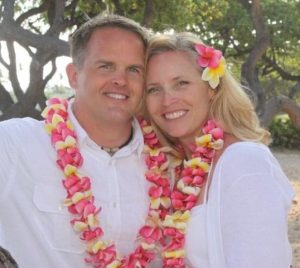
Kelly’s bike trip wasn’t just something he wanted to do; Shelley, too, wanted him to go on with it. “His strength comes from giving to others,” she said. “I wanted to support him with something that meant so much to him.”
She spoke about something she learned after her diagnosis: that there’s a high percentage of couples who end up divorced after dealing with health crises. And she thinks it’s crucial that people recognize the role of the caregiver, and the impact that any cancer diagnosis has on the people who are not diagnosed.
“They’re giving so much energy to us,” she said. “They need to regenerate. They need to get their buckets full again. And the way that Kelly does this is by giving to others.”
Shelley acknowledges that their marriage got stronger because of the hardship that they went through. “It goes back to that ‘F you, F you, F you’ and then ‘thank you, thank you, thank you,’” she said.
The best advice
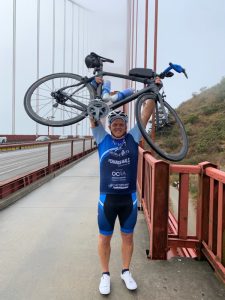
Aside from being the squeaky wheel, and acknowledging the ones who helped you through treatment, Shelley would advise others dealing with ovarian cancer to continue to set goals. During chemo, Shelley’s goal was to play in the U.S. Senior Women’s Open Qualifier the day before her 6th and last chemo treatment, a tournament that requires walking the entire way, a distance equivalent to 4-5 miles.
“I shot a million that day but qualifying was not the goal. I needed to know I could physically get through the 5-hour round up and down hills,” Shelley said. “It’s important to have control over something.”
As for Kelly’s best advice, he turns to his playlist – an eclectic array of music that accompanied him over mountains and across great spans of the outdoors. Tim McGraw’s song “Live Like You Were Dying” is what speaks loudest to him.
“For those who haven’t had a diagnosis or a life-changing event, take advantage now and do what you can. And those who have,” Kelly said, “if you’re given a second chance, then make the most of it and be kinder to people and just try to be a good role model.”
You can learn more about Kelly’s ride and support his efforts at kellyridesfor5.com.
Want to create your own fundraiser for OCRA? Learn how to become an OCRA Hero and start making a difference today!
